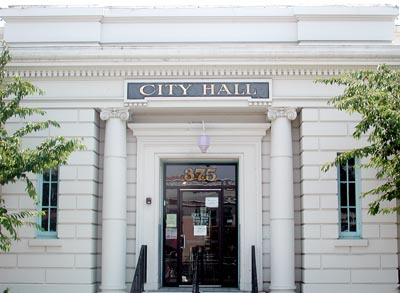The Hollister City Council is expected to approve a new,
expensive retirement benefit for the local police on Monday night.
Marty Richman’s analysis of the deal prompts some serious
questions. How can the city agree to a lifetime of increased
benefits in exchange only nine months in premiums in the middle of
the deepest recessions and budget crises they have faced in
decades? Why are they trying to buy a tiny giveback today for
significant costs tomorrow? And isn’t that how we got into this jam
in the first place?
The Hollister City Council is expected to approve a new, expensive retirement benefit for the local police on Monday night. Our current generous formula – up to 90 percent for life – is based on the average of the officer’s last three years of compensation. Under the new proposal, the basis would change to one-year final compensation, a number that usually is much higher than the three-year average.
This was supposedly part of a give-back that the city has been negotiating with the police department since last fall, when all the other bargaining groups agreed to accept a 5-percent pay reduction without benefit increases.
Officials claim this benefit will be fully funded by the police and cost the city nothing. I’m always willing to give up something for nothing, but that sounds too good to be true. And you know the rest of that saying.
CalPERS, the California Public Employees’ Retirement System, is required to disclose the estimated costs of changing contracts. In this case, the Plan’s Accrued Liability – it’s the total dollars needed to fund all benefits earned in the past for current members – increased by $350,000 to $20.6 million. Meanwhile, the Plan’s Present Value of Benefits, the total dollars needed to fund all benefits earned in the past, or expected to be earned in the future for current members, increased by $562,000 to $26.7 million.
The immediate funding source would be a 1.485-percent increase in the city’s contribution to CalPERS, raising our share to 37.722 percent. The nine-month cost for the balance of this fiscal year is $21,680. That’s exactly what the police have agreed to make up in “other compensation.”
Even if you believe in deals made for hard-to-identify “other compensation” – and I don’t – there are still three big problems. The retirement increases are forever, while the “other compensation” offset is only for nine months. The $21,680 does not actually cover the costs and there is no agreement for the police to cover the costs in the future. If the police don’t pay for the benefit they are entitled to by contract, I’ll give you one guess on who the council plans to stick with the bill. It’s not easy to turn $21,680 into $350,000, much less $562,000.
It’s important to note that the “as of” date for these numbers is June 2008, pre-crash; CalPERS is operating two-years in arrears. No one knows exactly how much money CalPERS has lost since 2002 – they are not talking – but the estimates are enormous. Their security-lending program alone is reported to have auctioned off “an eye-popping $835 billion worth of assets in the last eight years,” according to Calpensions, a blog site on the topic.
Normally, losses would call for huge rate increases, but to ease the rate shock, CalPERS adopted a radical smoothing policy in 2005 that spreads gains and losses over 15 years, far beyond the periods used by most pension funds, three to seven years. A second smoothing policy adopted last year phases in the big losses from the crash and recession over a three-year period. The new smoothing policy lowered what would have been a $900 million state increase to $200 million.
A recent 18-percent increase does not get the rate back to anywhere near even. So the 1.485-percent increase they are applying and the police have agreed to offset for nine months: it is artificially low. The difference will be rolled forward into future years and eventually charged to the city with interest.
The questions are obvious. How can the city agree to a lifetime of increased benefits in exchange only nine months in premiums in the middle of the deepest recessions and budget crises they have faced in decades? Why are they trying to buy a tiny giveback today for significant costs tomorrow, and isn’t that how we got into this jam in the first place? Finally, how much of this benefit is to make consolidation with the county sheriff’s office so expensive that it can’t be done?
Maybe the city is merely the world’s worst labor negotiator.
Perhaps it’s a combination of all the above.
Marty Richman is a Hollister resident. He writes a weekly column for the Free Lance. Monday’s council meeting is set for 6:30 p.m. at Hollister City Hall on Fifth Street.





